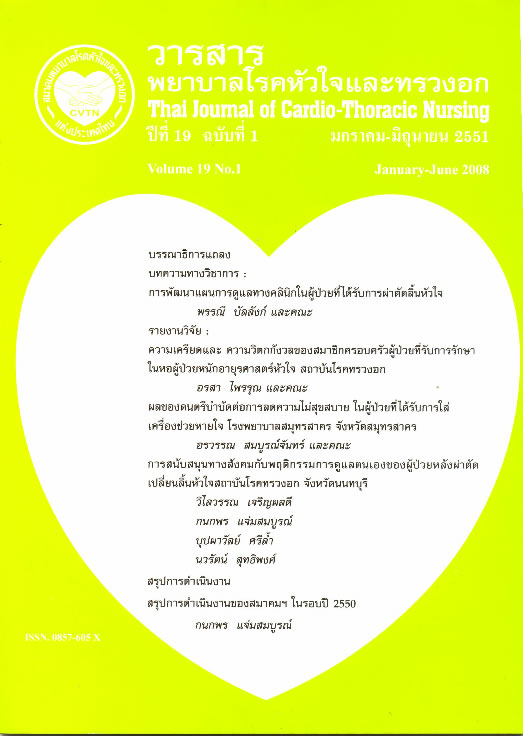ผลของดนตรีบำบัดต่อการลดความไม่สุขสบายในผู้ป่วยที่ได้รับการใส่เครื่ีองช่วยหายใจ โรงพยาบาลสมุทรสาคร จังหวัดสมุทรสาคร
คำสำคัญ:
ผู้ป่วยวิกฤต, ความไม่สุขสบาย, เครื่องช่วยหายใจ, ดนตรีบำบัด, Critical patient, uncomfortable, Ventilator, Music therapyบทคัดย่อ
บทคัดย่อ
ปัจจัยสำคัญของความไม่สุขสบายต่อร่างกายและจิตใจของผู้ป่วยระหว่างได้รับเครื่องช่วยหายใจคือ กิจกรรมการรักษา กิจกรรมการพยาบาล และปัจจัยด้านสิ่งแวดล้อม การวิจัยครั้งนี้เป็นการวิจัยกึ่งทดลอง แบบสลับกลุ่ม (Cross-over design) เพื่อศึกษาผลของดนตรีบำบัดในการลดระดับความไม่สุขสบาย และการ เปลี่ยนแปลงทางสรีรวิทยา ได้แก่ อัตราการเต้นของหัวใจ อัตราการหายใจ และความด้นโลหิต กลุ่มตัวอย่าง เป็นผู้ป่วยที่ได้รับการใส่เครื่องช่วยหายใจ รับการรักษาอยู่ในห้องผู้ป่วยหนัก 2 โรงพยาบาลสมุทรสาคร ระหว่าง เดือนธันวาคม พ.ศ. 2550 ถึงมีนาคม พ.ศ. 2551 เลือกกลุ่มตัวอย่างแบบเฉพาะเจาะจง (Purposive sampling) จำนวน 22 ราย และสุ่มเข้าอยู่ระยะทดลองก่อนหรือหลัง โดยในระยะทดลองกลุ่มตัวอย่างได้ รับดนตรีบำบัด 30 นาที เป็นเวลา 2 วัน และในระยะควบคุมกลุ่มตัวอย่างได้รับการพยาบาลตามปกติ เป็นเวลา 2 วัน ประเมินระตับคะแนนความไม่สุขสบายก่อนหลัง และประเมินผลการเปลี่ยนแปลงทาง สรีรวิทยาก่อน ขณะและหลังการบำบัด เพื่อเปรียบเทียบวิเคราะห์ข้อมูลโดยใช้สถิติ Wilcoxon และสถิติ Repeated measures ANOVA ผลการศึกษาพบว่า
1. ค่าเฉลี่ยคะแนนความไม่สุขสบายของกลุ่มตัวอย่างก่อนได้รับดนตรีบำบัดกับหลังได้รับดนตรีบำบัด ในแต่ละวัน พบว่ามีความแตกต่างอย่างมีนัยสำคัญทางสถิติที่ระดับ P < 0.05 โดยหลังได้รับดนตรีบำบัดมีระดับความไม่สุขสบายน้อยกว่าก่อนได้รับดนตรีบำบัด
2. ค่าเฉลี่ยอัตราการเต้นของหัวใจและการหายใจ ขณะได้รับดนตรีบัด นาทีที่ 10 นาทีที่ 20 นาทีที่ 30 และหลังหยุดดนตรีบำบัด 10 นาที พบว่ามีค่าเฉลี่ยของอัตราการเต้นของหัวใจและการหายใจน้อยกว่า ที่ 5 นาทีก่อนได้รับดนตรีบำบัด อย่างมีนัยสำคัญทางสถิติที่ระดับ P < 0.05
จากผลการศึกษา มีข้อเสนอแนะว่าพยาบาลควรนำดนตรีบำบัดมาใช้เป็นแนวทางหนึ่งในการบำบัด ลดความไม่สุขสบายเกิดการผ่อนคลาย และเพิ่มประสิทธิภาพการพยาบาลยิ่งขึ้น
คำสำคัญ : ผู้ป่วยวิกฤต, ความไม่สุขสบาย, เครื่องช่วยหายใจ, ดนตรีบำบัด
Abstract
Factors affecting both patientûs physiological and psychological suffering in patients on mechanical ventilation involve nursing care procedures and environmental factors. This quasiexperimental research was designed to test the effectiveness of music therapy to decrease the suffering levels of patients on mechanical ventilation, and to enhance their physiological responses by decreasing heart rate, respiratory rate, and blood pressure. Samples consisted of twenty two patients, who retained endotracheal tubes with mechanical ventilation. The study was conducted from December 2007 to March 2008 in an Intensive Care Unit 2 at Samutsakorn Hospital, Samutsakorn province. A crossover design was used in this research study to compare the changes in suffering levels and physiological responses among the same patients during two periods: experimental period and control period. During the experimental period, the samples listened to the music for 30 minutes, whereas they received routine nursing care during the control period. The suffering levels and physiological responses (heart rate, respiratory rate, and blood pressure) were assessed in time. Data were analyzed by using wilcoxon and repeated measures ANOVA. The results of this study are as follow: 1. After the music therapy, the mean of suffering level in patients on mechanical ventilator was significantly lower than before receiving music therapy (p < 0.05); 2. After the music therapy, the mean of heart rate and respiratory rate at 10 minutes, 20 minutes 30 minutes, and 10 minute after stopping the music, were significantly decreased when compared to the mean of heart rate and respiratory rate at 5 minute before receiving music therapy (p < 0.05). In conclusion, this study demonstrated the usefulness of music therapy as a nursing intervention to reduce suffering and to promote relaxation of patients on mechanical ventilation.
Key Word : Critical patient, uncomfortable, Ventilator, Music therapy
ดาวน์โหลด
รูปแบบการอ้างอิง
ฉบับ
ประเภทบทความ
สัญญาอนุญาต
บทความนี้ยังไม่เคยตีพิมพ์หรืออยู่ในระหว่างส่งไปตีพิมพ์ในวารสารอื่น ๆ มาก่อน และกองบรรณาธิการขอสงวนสิทธิ์ในการตรวจทาน และแก้ไขต้นฉบับตามเกณฑ์ของวารสาร ในกรณีที่เรื่องของท่านได้ได้รับการตีพิมพ์ในวารสารฉบับนี้ถือว่าเป็น ลิขสิทธิ์ของวารสารพยาบาลโรคหัวใจและทรวงอก






